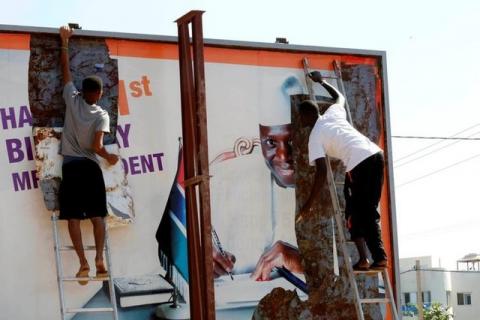Advertisement
As Gambians lose fear, President Jammeh's isolation grows
BANJUL (Reuters) - Lawyers, trade unions, teachers and journalists have joined a growing chorus of demands for Gambian President Yahya Jammeh to accept his defeat in a Dec. 1 election, as people lose their fear of the man who has ruled them for the past 22 years.
As lawyers prepared to attend a meeting of the Gambian Bar Association on Monday, the intelligence service rang them with threats and monitored the ritzy Coco Ocean Hotel where they gathered, said the association's Secretary General Aziz Bensouda.
But since the shock opposition victory that brought Gambians out on the streets of the capital Banjul in boisterous celebration, the familiar menacing tactics have lost their usual effectiveness.
"The intimidation did not work," said Bensouda. "At the end, no one feared anything."
After first conceding defeat to little-known challenger Adama Barrow, Jammeh last week rejected the voting results and his party is challenging them at Gambia's Supreme Court.
Whether the small West African country can achieve its first peaceful transition of power in more than 50 years is an important question for a region long used to authoritarian rulers and sporadic coups. A top United Nations official said this week that Jammeh would face strong sanctions if he tried to cling to power beyond the end of his elected term next month.
Following the five-hour bar association meeting, dozens of lawyers stood on the tiled steps of the resort's meeting room at dusk and accused Jammeh of "treason" for refusing to step down.
Just a few onlookers were present, but the statement prompted an unprecedented cascade of similar denunciations.
The next day, the Gambia Teachers Union called Jammeh's refusal to leave office a "recipe for chaos and disorder which undoubtedly endangers the lives of all Gambians."
On Wednesday, the Gambian press union, one of the most harshly persecuted groups under Jammeh, said he must back down.
"The defeat was conceded. There is, therefore, no turning back," it said.
Transport and medical unions and the Chamber of Commerce echoed that call in statements on Thursday.
"ILLUSION SHATTERED"
The public demands have left Jammeh, who took power in a 1994 coup and once vowed to rule for "a billion years", looking isolated both internationally and domestically in the country of 1.8 million.
Gambians are now openly speaking out against him in places they didn't dare before - in taxis, markets and on the phones and computers they used to worry were tapped.
"The illusion of Jammeh as Gambia's all-seeing and all-knowing overlord has been shattered for ever. The fear among Gambians is gone," said Jeffrey Smith from campaign group Vanguard Africa.
The lawyers who first spoke out against Jammeh had pent-up frustrations to voice. Their jobs had long been a struggle. Gaining access to detained clients was often impossible in the face of recalcitrant security officials. Many received death threats for representing Jammeh's political opponents.
With Gambians too fearful to serve on the Supreme Court and the High Court, lawyers and judges have had to be brought in from abroad to fill key positions.
So when the association brought forward this week's meeting to discuss the president's defiance, its attendance ballooned from the usual couple of dozen members to nearly 100.
As they scoured the constitution for legal arguments against Jammeh, the tense atmosphere was suddenly broken.
"A senior lawyer said, 'Let's just call it what it is. It is treason.' The room exploded in applause," said Bensouda, who was present.
The lawyers voted to approve that wording, then celebrated with a meal of butter-fried shrimp and beef brochettes. Many hugged and laughed.
"We have compromised ourselves for too long and have not stood up because of fear," said Bensouda. "When Jammeh lost the election, it solidified everyone."
(Editing by Joe Bavier and Mark Trevelyan)



















Add new comment